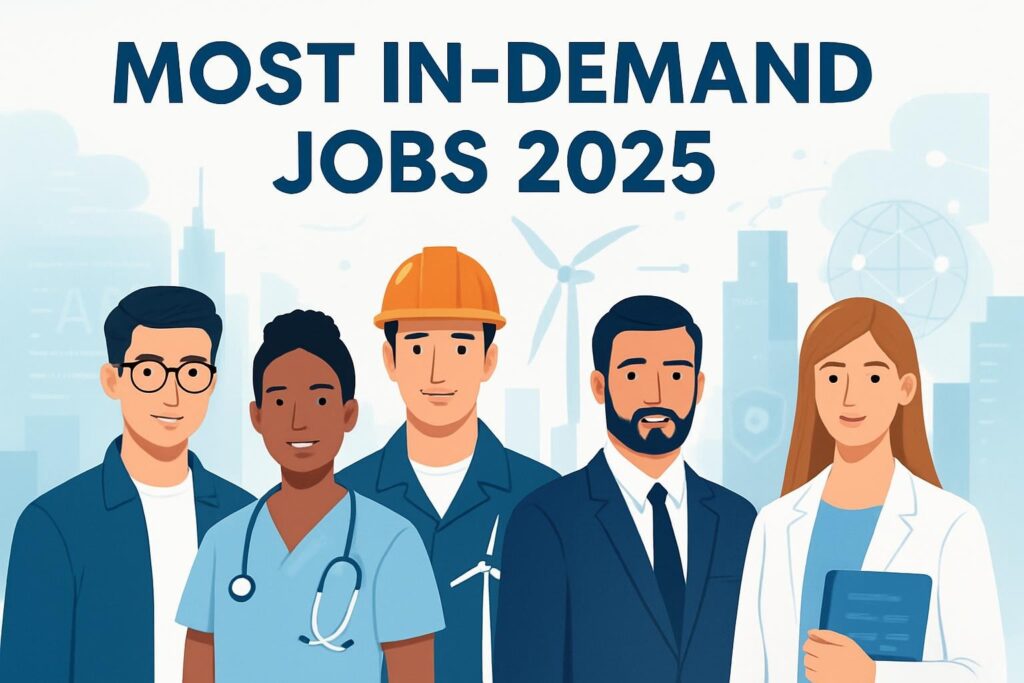
As we step deeper into 2025, the global job market is evolving faster than ever before. Technology, healthcare, sustainability, and digital transformation are reshaping the types of roles employers are desperate to fill. For job seekers, this is both an opportunity and a challenge — opportunity, because many high-growth roles are open across industries; and challenge, because skills and adaptability matter more than ever. In this comprehensive guide, we’ll explore the most in-demand jobs in 2025 across the globe, analyzing trends, required skills, average salaries, and future prospects. Whether you’re a graduate deciding on a career path or a professional looking to upskill, these insights will help you stay ahead in a competitive marketplace.
1. Artificial Intelligence Specialists
Artificial Intelligence (AI) is no longer a futuristic concept. From healthcare to finance, logistics to entertainment, AI specialists are revolutionizing how industries operate. In 2025, AI specialists — including machine learning engineers, natural language processing experts, and robotics engineers — are among the most sought-after professionals worldwide.
AI’s adoption has accelerated due to the rise of automation, generative AI tools, and personalized customer experiences. Industries like e-commerce use AI for recommendation engines, healthcare applies AI in diagnostics, and finance leverages it for fraud detection. AI’s global job market is estimated to be worth billions, with top countries like the U.S., Germany, India, and China leading the demand.
Required skills for AI specialists include Python, R, TensorFlow, data modeling, and ethical AI practices. The average salary for AI professionals ranges from $110,000 to $160,000 in the U.S., with Europe and Asia offering competitive packages adjusted to local economies. Certifications from institutions like Stanford, MIT, or platforms like Coursera can significantly enhance employability.
One of the biggest challenges is the ethical use of AI. Employers are not only hiring for technical expertise but also for professionals who understand the societal impacts of AI, from bias reduction to data privacy. This means soft skills such as problem-solving, communication, and ethical reasoning are as important as technical proficiency.
Internal link for job seekers: Top Job Search Strategies in 2025
External authority: World Economic Forum: Future of Jobs Report
2. Healthcare Professionals
The healthcare industry remains one of the fastest-growing sectors globally. In 2025, the demand for nurses, doctors, pharmacists, and mental health professionals is at an all-time high. The COVID-19 pandemic created a permanent shift in healthcare, increasing reliance on telemedicine, digital patient records, and mental health services.
Nursing in particular faces global shortages. According to the World Health Organization, over 6 million nurses are needed worldwide. Developed nations are competing to attract foreign-trained nurses, offering visa sponsorships and competitive salaries. Telemedicine doctors are another rising role, as patients increasingly prefer online consultations for convenience.
Mental health professionals — therapists, counselors, and psychologists — are also in demand, with stress, burnout, and lifestyle diseases on the rise. Employers are hiring mental health specialists not only in hospitals but also in corporations as part of wellness programs.
Healthcare professionals need skills in digital health tools, empathy, crisis management, and up-to-date medical knowledge. Salaries vary widely: nurses in the U.S. average $85,000 annually, while in Europe and Asia the pay is growing due to shortages.
Internal link: How to Negotiate Your Salary After a Job Offer
External link: World Health Organization Careers
3. Renewable Energy Specialists
Climate change and sustainability are reshaping global employment. Renewable energy specialists are among the top careers in 2025, driven by investments in solar, wind, and green hydrogen. Governments worldwide are pledging to reduce carbon emissions, and that means companies are racing to hire talent in clean energy sectors.
Solar engineers, wind turbine technicians, and sustainability analysts are some of the fastest-growing roles. For example, India has committed to building some of the largest solar farms, while Europe is focusing on offshore wind projects. In Africa, renewable energy is creating jobs by expanding access to electricity in rural areas.
Required skills include environmental engineering, project management, electrical engineering, and regulatory knowledge. Certifications in energy management or green building design boost employability. Salaries are competitive, with renewable energy engineers earning $70,000–$130,000 annually depending on specialization and region.
Internal link: 10 Common CV Mistakes and How to Fix Them
External resource: International Energy Agency on Renewables
4. Cybersecurity Experts
Cybersecurity is a critical field in 2025, as cyberattacks grow more sophisticated. With global businesses operating in digital environments, protecting sensitive data has never been more important. Cybersecurity experts — from penetration testers to cloud security engineers — are vital to every organization.
The rise of remote work has amplified vulnerabilities. Ransomware attacks, phishing scams, and nation-state cyber threats are pushing companies to invest heavily in cybersecurity talent. Banking, healthcare, and e-commerce industries are especially at risk.
Required skills include knowledge of firewalls, cryptography, incident response, compliance frameworks (like GDPR and HIPAA), and tools such as SIEM. Certifications like CISSP, CISM, and CEH are in high demand. Salaries average $95,000–$150,000 annually depending on experience and geography.
Internal link: Job Interview Tips
External link: Cybersecurity Courses on Coursera
5. Data Analysts and Data Scientists
Data is the new oil, and in 2025, data analysts and scientists are crucial across all industries. Businesses rely on big data to make informed decisions, understand consumer behavior, and optimize operations. From retail predicting purchasing patterns to governments using data for policy-making, the applications are endless.
Required skills include SQL, Python, R, Tableau, and cloud data platforms like AWS and Google BigQuery. Professionals must also have strong business acumen to translate raw data into actionable insights. Data visualization and storytelling skills are highly valued.
Salaries for data professionals range from $90,000 to $140,000 annually in the U.S., with high demand in Asia, Europe, and the Middle East. Freelance opportunities are also abundant for data professionals, allowing flexibility in career paths.
Internal link: How to Write a Winning Cover Letter
External link: Harvard Business Review on Data Science
6. Digital Marketing Specialists
Digital marketing is thriving in 2025. With businesses relying on online presence, digital marketers who understand SEO, social media, influencer campaigns, and AI-driven advertising are in high demand. E-commerce growth, fueled by social commerce and mobile-first strategies, is driving this demand globally.
Specializations include SEO managers, content strategists, PPC specialists, and marketing automation experts. Tools like Google Analytics, SEMrush, HubSpot, and AI-powered campaign managers are essential.
Salaries vary widely: digital marketers in the U.S. average $70,000, while specialists in developing markets can command competitive rates due to increasing demand.
Internal link: Top Job Search Strategies for Professionals
External link: Moz SEO Learning Center
7. Remote Work Coordinators
The rise of hybrid and remote work has created a new profession: Remote Work Coordinators. These professionals manage remote teams, oversee digital collaboration, and maintain productivity. In 2025, companies across industries are hiring specialists to optimize remote workflows.
Skills required include project management, HR practices, familiarity with tools like Slack, Asana, and Zoom, as well as cultural competence for global teams. They also need to address cybersecurity risks associated with remote setups.
Remote Work Coordinators ensure work-life balance, prevent burnout, and design hybrid workplace policies. Salaries average $65,000–$100,000 depending on company size and geography.
Internal link: Avoid Common CV Mistakes in Remote Job Applications
External link: Remote Work Blog
Expanded FAQs
Q1: Which job is most in-demand globally in 2025? AI Specialists and Healthcare Professionals top the list, with roles in renewable energy and cybersecurity following closely.
Q2: What skills should I prioritize to remain competitive? Data literacy, digital communication, adaptability, and emotional intelligence are universally valuable.
Q3: Do certifications matter? Yes, certifications in AI, cybersecurity, and project management significantly improve job prospects.
Q4: Which countries have the highest demand? The U.S., Canada, Germany, Australia, and emerging economies like India are hiring aggressively.
Q5: How can I negotiate my salary? Check out our salary negotiation guide for proven strategies.
Q6: Are remote jobs sustainable long-term? Yes. Many companies are making hybrid work permanent, creating steady demand for remote work coordinators.
Q7: What entry-level roles are growing fastest? Junior data analysts, renewable energy technicians, and digital marketing assistants are popular entry points.
Q8: Is healthcare still a safe career choice? Absolutely. With aging populations and ongoing global health challenges, healthcare demand is rising worldwide.
Q9: Do AI jobs require a master’s degree? Not always. Many employers value practical skills and certifications as much as formal degrees.
Q10: Where can I learn more about future jobs? External authority: OECD Employment Outlook



